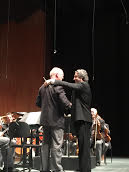Muti bows two Vienna Phil players into retirement
mainAt the Salzburg Festival this afternoon, Riccardo Muti gave both concertmaster Rainer Küchl (pictured) and first violinist Eckhard Seifert solo bows after the concert, which appears to be their last.
The first half was Richard Strauss Le bourgeois gentilhomme, apparently programmed for Rainer to float his trademark solos.
Second half was Bruckner 2nd symphony.






Comments